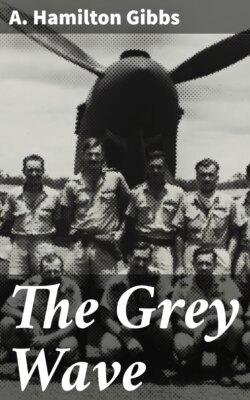Читать книгу The Grey Wave - A. Hamilton Gibbs - Страница 7
2
ОглавлениеWoolwich!
Bad smells, bad beer, bad women, bad language!—Those early days! None of us who went through the ranks will ever forget the tragedy, the humour, the real democracy of that period. The hand of time has already coloured it with the glow of romance, but in the living it was crude and raw, like waking up to find your nightmare real.
Oxford University doesn’t give one much of an idea of how to cope with the class of humanity at that Depot in spite of Ruskin Hall, the working-man’s college, of which my knowledge consisted only of climbing over their wall and endeavouring to break up their happy home. But the Ruskin Hall man was a prince by the side of those recruits. They came with their shirts sticking out of trousers seats, naked toes showing out of gaping boots, and their smell—— We lay at night side by side on adjoining bunks, fifty of us in a room. They had spent their two days’ pay on beer, bad beer. The weather was hot. Most of them were stark naked. I’d had a bath that morning. They hadn’t.
The room was enormous. The windows had no blinds. The moon streamed in on their distorted bodies in all the twistings of uneasy sleep. Some of them smoked cigarettes and talked. Others blasphemed them for talking, but the bulk snored and ground their teeth in their sleep.
A bugle rang out.
Aching in every limb from the unaccustomed hardness of the iron bed it was no hardship to answer the call. There were lavatories outside each room and amid much sleepy blasphemy we shaved, those of us who had razors, and washed, and in the chill of dawn went down to a misty common. It was too early for discipline. There weren’t enough N.C.O.’s, so for the first few days we hung about waiting for breakfast instead of doing physical jerks.
Breakfast! One thinks of a warm room with cereals and coffee and eggs and bacon with a morning paper and, if there’s a soot in our cup, a sarcastic reference as to cleanliness. That was before the war.
We lined up before the door of a gun shed, hundreds of us, shivering, filing slowly in one by one and having a chunk of bread, a mug of tea and a tin of sardines slammed into our hands, the sardines having to be divided among four.
The only man in my four who possessed a jack-knife to open the tin had cleaned his pipe with it, scraped the mud off his boots, cleaned out his nails and cut up plug tobacco. Handy things, jack-knives. He proceeded to hack open the tin and scoop out sardines. It was only my first morning and my stomach wasn’t strong in those days. I disappeared into the mist, alone with my dry bread and tea. Hunger has taught me much since then.
The mist rolled up later and daylight showed us to be a pretty tough crowd. We were presently taken in hand by a lot of sergeants who divided us into groups, made lists of names and began to teach us how to march in the files, and in sections,—the elements of soldiering. Some of them didn’t seem to know their left foot from their right, but the patience of those sergeants was only equalled by the cunning of their blasphemy and the stolidity of their victims.
After an hour of it we were given a rest for fifteen minutes, this time to get a handful of tobacco. Then it went on again and again,—and yet again.
The whole of that first period of seven days was a long jumble of appalling happenings; meals served by scrofulitic hands on plates from which five other men’s leavings and grease had to be removed; bread cut in quarter loaves; meat fat, greasy, and stewed—always stewed, tea, stewed also, without appreciable milk, so strong that a spoon stood up in it unaided; sleeping in one’s clothes and inadequate washing in that atmosphere of filth indescribable; of parades to me childish in their elementariness; of long hours in the evening with nothing to do, no place to go, no man to talk to,—a period of absolute isolation in the middle of those thousands broken only by letters which assumed a paramount importance, constituting as they did one’s only link with all that one had left behind, that other life which now seemed like a mirage.
Not that one regretted the step. It was a first-hand experience of life that only Jack London or Masefield could have depicted. It was too the means of getting out to fight the Boche. A monotonous means, yes, but every day one learnt some new drill and every day one was thrilled with the absolute cold-blooded reality of it all. It was good to be alive, to be a man, to get one’s teeth right into things. It was a bigger part to play than that of the boy in “The Blindness of Virtue.”
